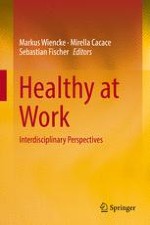2016 | OriginalPaper | Chapter
Self-Endangering Work Behavior
Authors : Jan Dettmers, Nicole Deci, Sophie Baeriswyl, Martial Berset, Andreas Krause
Published in: Healthy at Work
Publisher: Springer International Publishing
Activate our intelligent search to find suitable subject content or patents.
Select sections of text to find matching patents with Artificial Intelligence. powered by
Select sections of text to find additional relevant content using AI-assisted search. powered by
